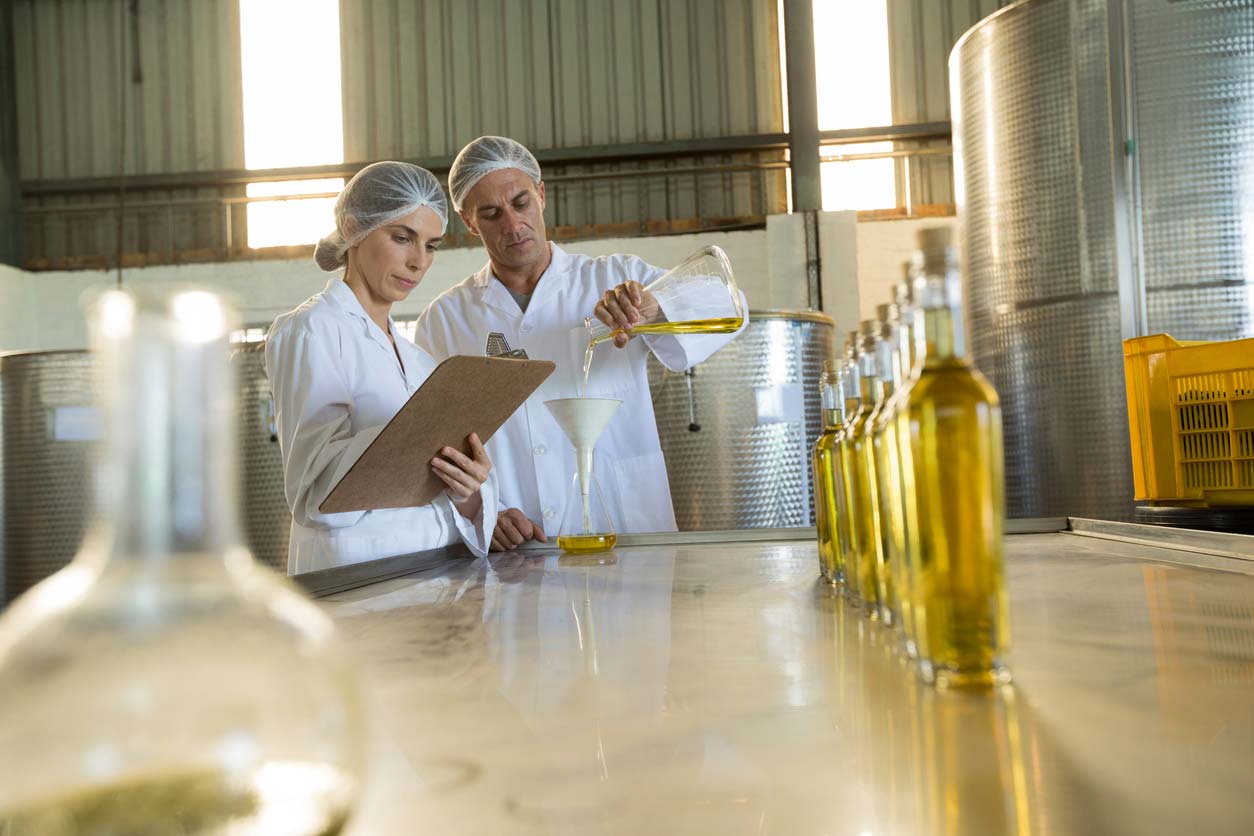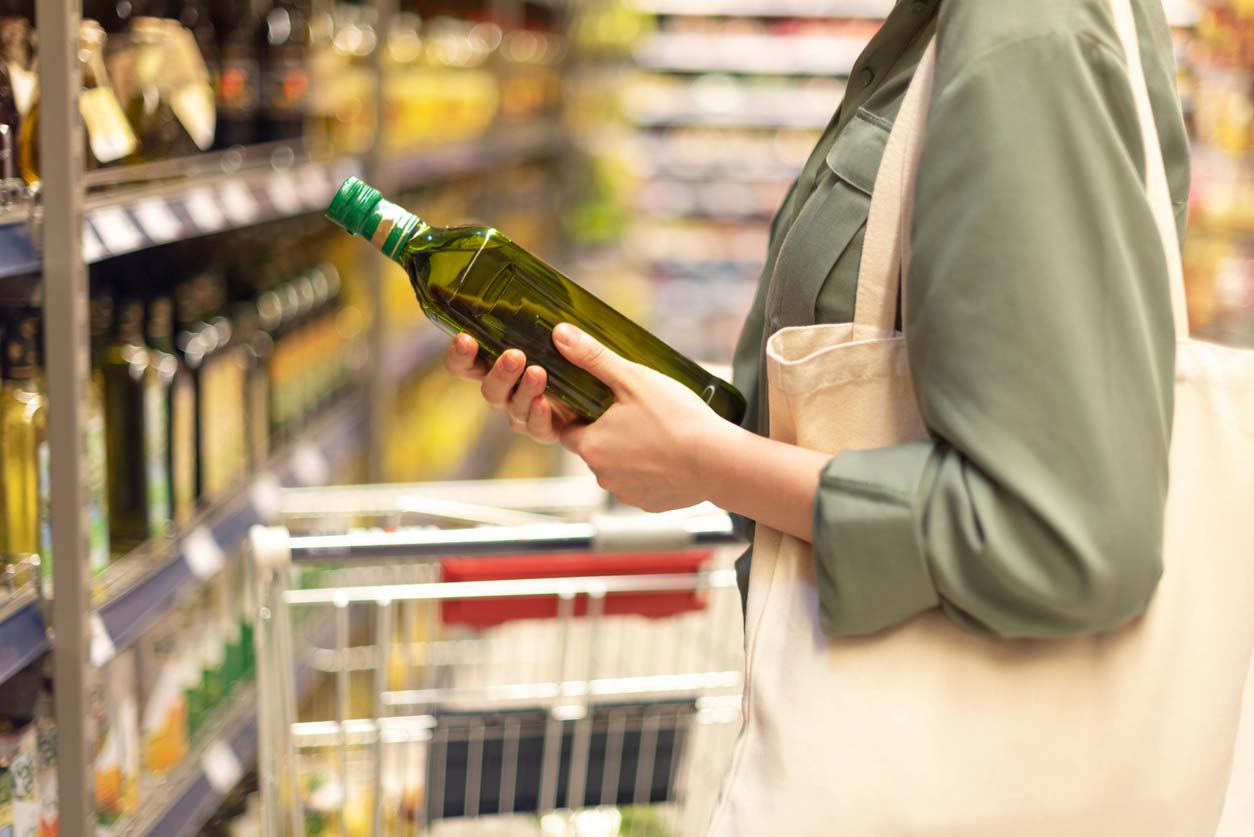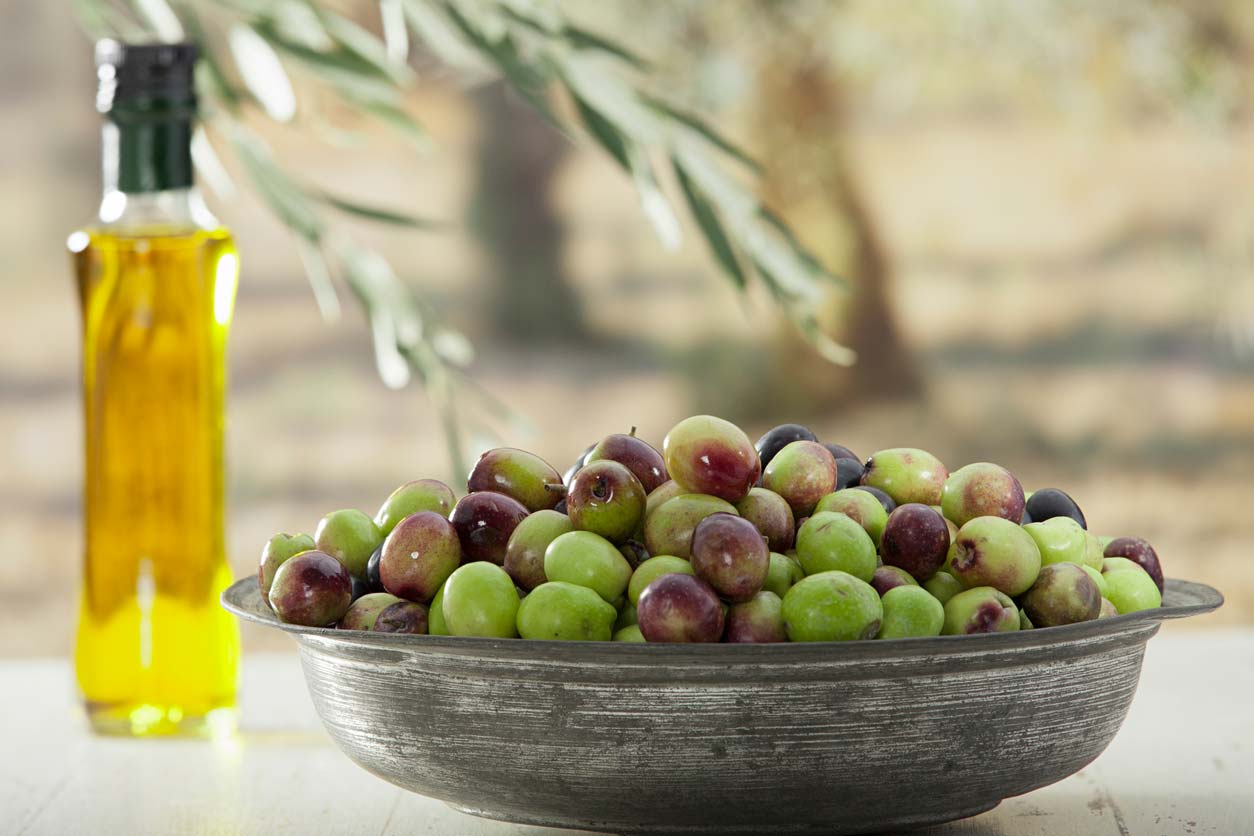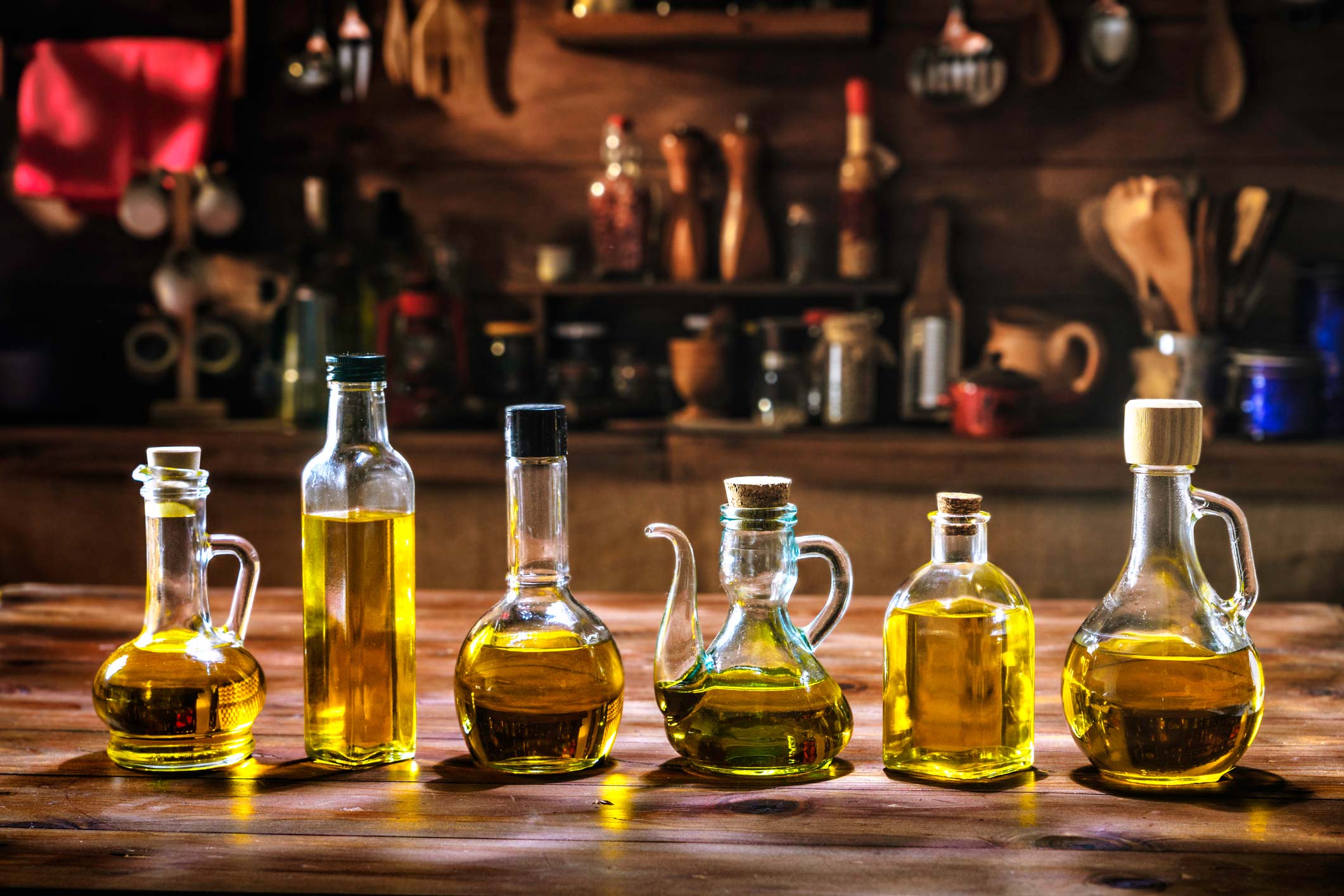This article was modified on November 18, 2020 to correct factual inaccuracies.
Where’s the vegetable oil in your kitchen? Sitting next to the stovetop? Above the microwave? Tucked away on a pantry shelf next to the baking items? If you’re fancy, you may have an elegant olive oil dispenser on your dining room table. Many of us use vegetable oil on a regular basis for stir-frying, sauteing, and dressing salads. If vegetable oils aren’t the most exciting items in our larders, hey, at least they’re dependable. We know what’s in them, and we don’t have to worry about poor quality ingredients.
Well, not so fast.
It turns out that some vegetable oils are not of the quality they claim. And some may not even be the oil we think they are at all. Rather, some vegetable oils appear to be the long-time victim of an unfortunately widespread industry scandal called food fraud.
What is Food Fraud?
According to experts at the National Center for Food Protection and Defense, “food fraud is a collective term used to encompass the deliberate and intentional substitution, addition, tampering, or misrepresentation of food, food ingredients, or food packaging; or false or misleading statements made about a product, for economic gain.”
In other words, if you thought you could read a food package and automatically trust all the claims plastered on it, this should make you very uncomfortable.
Food Fraud in the Oil Industry

Food fraud in the oil industry isn’t new. There’s a spectacular case from 1963, dubbed the “Salad Oil Scandal,” in which a shady company, Allied Crude Vegetable Oil, won a contract to provide salad oil to developing countries via a US government program called Food for Peace. In a scheme far too convoluted to recount here, Allied hoodwinked hundreds of millions of dollars (worth billions in today’s money) from investment banks by misrepresenting the amount of vegetable oil they had in inventory. They did it by filling tanker ships almost to the brim with water and then adding a thin layer of vegetable oil on top. While today’s food fraud isn’t that brazen (you’d probably notice if your expensive bottle of Ultra Premium Extra Virgin Olive Oil was mostly water), journalists and researchers are now uncovering fraud — and low-quality products — that are worth paying attention to.
Fake Avocado Oil
A 2020 report from UC Davis, published in the journal Food Control, was the first study in the United States regarding comprehensive avocado oil quality and purity. The researchers found that most of the avocado oils they tested were of poor quality, mislabeled, or in some cases were actually combined with other lesser-quality oils.
One indication of low quality is that many US brands of avocado oil were found to have gone rancid before their stamped expiration date. What’s more, some shouldn’t have been called avocado oil at all. Researchers found that some US brands were mixed with other cheaper, lower-quality oils like sunflower, safflower, or soybean oil.
In three of the oils tested, the soybean content was nearly 100%, which meant that the so-called avocado oil didn’t come from any avocado whatsoever. The researchers also found evidence that damaged avocados of lesser quality were frequently used in the processing of the oils. This led to the oil oxidizing before it even hit the shelf, reducing nutritional benefits and expected quality.
The problematic samples tested had a reduced level of DAGs — 1,2-diacylglycerol and 1,3-diacylglycerol, breakdown products of triacylglycerols — indicating that they were already oxidized, of poor quality, and/or degraded with cheaper refined oils. Additionally, many samples had elevated levels of PPPs — pyropheophytins, or breakdown products of chlorophyll — also indicating they were oxidized and/or mixed with cheaper refined oils.
As disappointing as the findings from the UC Davis study were, testing shows that food fraud is not unique to avocado oil. The darling of the vegetable oil industry, olive oil, is another product that may present some concerns.
Fake Olive Oil?
Think about the olive oil selection you have at the grocery store. Many bear an Italian-esque name or say “Made in Italy,” drawing us in with their supposed authenticity. Sadly, some Italian olive oil may be rife with fraud. Elaine Sciolino wrote for the New York Times that “much of the ‘extra-virgin Italian olive oil’ flooding the world’s markets is neither Italian nor virginal.”
Extra virgin olive oil must, by definition, come from the first fresh press of olives — and have zero additives. So when something is labeled that way, we just assume it’s true. Unfortunately, the mafia has infiltrated the agricultural industry, creating a term known as “Agromafia.” Just like with avocado oil, olive oil could be blended with other unlisted, lower-quality plant oils, and may be disguised with colorings and fragrances, thus fooling most consumers. Some olive oils are of poor quality or have already gone rancid as well.
The problem is so widespread, and the profit margin is so enormous — up to 2000% percent according to insiders — that the scope of olive oil fraud has actually been linked to the illegal drug trade. In fact, in 2015, Italian police seized 7,000 tons of fake Italian “olive oil” in a single raid.
Not only does food fraud reduce the quality of oils, but it can also pose risks to public health. The fact that other classic, beloved foods from Italy are adulterated — such as mozzarella (whitened with detergent) and bread (made with sawdust or asbestos) — offers a frightening window into the reality of the commercial and imported food system.
In response to these concerns, the Italian government has imposed strict export controls in an effort to protect the reputation of its olive oil industry.
How Can We Not Know If Our Oil Is Real?
Perhaps the biggest downfall when it comes to lack of protection for the quality of olive oil is that there’s no federal regulation of bottled oils and their label claims in the US. However, some states are passing bills with stronger requirements for olive oil labeling. In 2008, California passed SB-634, which states that it’s “unlawful to manufacture, sell, offer for sale, give away, or to possess imitation olive oil in California.” And that any oil labeled “California Olive Oil,” must solely come from California olives.
However, because of the lack of federal regulation, there’s a lot of money to be made by the Agromafia, as well as other domestic companies, who are cutting more expensive oils with cheap, low-quality ones — sometimes selling them as premium products.
The good news is that while we don’t know how common it is, outright fraud in the olive oil industry may be relatively rare in the United States. In 2015, the US Food and Drug Administration published peer-reviewed research about olive oil authenticity in the Journal of American Oil Chemists’ Society. Researchers concluded that the occurrence rate of adulteration for the market samples they analyzed was “low.”
Should You Eat Olive or Avocado Oil?

The most surefire way to make sure you’re not purchasing, consuming, or supporting fraudulent oil is to skip out on added oil in your diet altogether.
Going oil-free, or nearly so, may be your healthiest option. And many people have adopted this lifestyle in recent years with success. (Find out more about why, and get some delicious oil-free salad dressing recipes, here.)
However, if you do want to include some oil in your diet, olive and avocado oils are actually among the best options — or at least among the least problematic — when it comes to potential health impact. Why? Both of these oils (in their purest forms) contain low levels of omega-6 fatty acids, which is good since omega-6s are pro-inflammatory when consumed in excess of their anti-inflammatory omega-3 fat counterparts. Avocado and olive oils also contain low amounts of saturated fat compared to other bottled vegetable oils. Consumption of saturated fat in large amounts can raise your risk for high cholesterol, clogged arteries, and heart disease.
Of course, eating avocados in their whole food form is far healthier than eating avocado oil. But the oil (if it’s real and unadulterated) can provide nutrients found to reduce cholesterol, improve heart health, improve eye health, and increase absorption of health-boosting carotenoids that are abundant in salad vegetables (avocado salad dressing, meet salad!). And extra-virgin olive oil (the real stuff!) is rich in oleic acid and antioxidants and may have anti-inflammatory properties. Studies suggest that it can help prevent strokes, heart disease, and even potentially type 2 diabetes, Alzheimer’s, and cancer.
Is Avocado or Olive Oil Actually Healthy?
A word of caution, however. While some studies show health benefits of avocado and olive oils, they are still processed foods. All of the fiber and many of the nutrients that were in the original food are gone.
It’s also possible that the health benefits associated with these oils are not caused by them so much as by what they replace. It stands to reason that almost anybody who replaces genetically engineered and highly inflammatory corn or soy oil with extra virgin olive oil can anticipate some health benefit. But it could be because of what they’re getting rid of rather than what they’re adding. Until there’s a significant study done on the health of whole food, plant-based eaters, some of who consume olive or avocado oil regularly, and others who do not consume much, if any, bottled oil, we’re unlikely to know with certainty what’s best for whom.
In the meantime, there might actually be an upside to paying top dollar for genuine olive and avocado oils. Their steep price means that you’ll probably use the oil much more sparingly — and appreciate it far more when you do.
Avocado Oil vs. Olive Oil
What should you look for when choosing an olive or avocado oil? There are a few things to keep in mind to minimize your risks for contamination and fraud when comparing brands.
How to Choose an Authentic Avocado Oil
When choosing an avocado oil:
- Evaluate the oil’s color the best you can. Real virgin avocado oil should be green, not yellow.
- Check the harvesting or production date on the bottle. This will indicate when the avocados were harvested for use to ensure maximum freshness. The “Best Before” date isn’t always a reliable indicator of avocado oil quality.
- Perform taste and smell tests if possible. Avocado oil should have a grassy, buttery taste — a bit like mushrooms. When it starts to go rancid, avocado oil starts to smell stale, almost like play-dough.
- Opt for organic and fair-trade whenever possible, to minimize the consumption of unnecessary pesticides — and support social justice within the industry.
Currently, no avocado oil equivalent to the IOC or other regulatory body exists. However, the research presented in this monograph on oilseeds, Gourmet and Health-Promoting Specialty Oils, offers a standard that the researchers believe is the beginning of an equivalent to olive oil.
How to Choose an Authentic Olive Oil
When choosing an olive oil:
- Look for seals of quality and certified origin, such as 100% Qualita Italiana (for Italy), or the California Olive Oil Commission (COOC) 100% Certified Extra Virgin seal. Or look for the North American Olive Oil Association’s NAOOA Certified Oil, bearing a red circular logo with a green olive branch.
- Buy 100% cold-pressed extra virgin olive oil and 100% organic if possible. Although this doesn’t necessarily guarantee quality or purity, certified organic varieties are far more likely to be subject to regulation and inspection, as well as to minimize risk for consuming pesticides.
- Consider the price point, understanding that if it seems too good to be true — or too cheap to be real — it very well may be. That doesn’t mean you should be spending exorbitant amounts of money on olive oil, but it’s also probably a good idea not to choose the cheapest option on the shelf.
- Purchase oils in dark-colored glass bottles. This helps protect the oil from oxidation — or the degradation of quality when exposed to oxygen — before it even hits the shelves. Darker bottles can also keep damaging light and temperatures at bay. As such, avoid oils sold in clear glass containers if possible.
- Look for a harvesting date or pressing date on the label. This tells you how long ago the pressing occurred. It’s optimal to choose the freshest oils possible, though when properly stored olive oil generally retains its goodness for as much as 18 months after bottling.
- While you most likely won’t be able to try the oil before you take it home, the opportunity to taste it can also indicate quality. Good quality olive oil should have a fruity taste in the front of your mouth and a peppery taste when it reaches the back.
The Best Way to Avoid Food Fraud in Vegetable Oil

While the most surefire way to reduce your consumption of and participation in fraudulent oils is to go oil-free, or nearly so, this may not be for everyone. If you do buy vegetable oils, do your research on the brands and potential indicators of quality. And remember, like many other things in life and the food system, if it seems too good to be true… it probably is.
Editor’s Note:
While many people today are choosing to use little or no bottled oils, many others may want to use olive or avocado oil — making sure they are of the highest possible quality. For those folks, here are a few options that we’ve thoroughly investigated. Each company is third party-certified, guaranteed to be free of adulteration, and are available for online purchase. (If you buy from any of these links, a portion of proceeds will go to support Food Revolution Network’s mission of healthy, ethical, and sustainable food for all.)
If you don’t see your preferred brand listed here, you can always contact them directly to ask if their olive oils are 3rd-party inspected for freshness and purity.
Kasandrinos Olive Oil offers 100% certified organic, single-origin olive oil from non-GMO verified olives. This olive oil comes from organic olive trees the Kasandrios family has been harvesting in Greece for generations. Find out more here.
Fresh Pressed Oil Club offers a quarterly subscription service for high-quality olive oils. The owner sources standout small artisanal producers around the world, from the Southern hemisphere (Chile, Australia, South Africa, etc.) for half the year and the Northern hemisphere (Greece, Italy, Spain, Portugal, etc.) the other half of the year, so the oils are always optimally fresh. It’s an amazing service, but pricy and not certified organic. They offer a bottle for just $1 with your first subscription. Find out more here.
Ava Jane’s Kitchen offers a subscription service for premium extra virgin avocado oil (not certified organic). If you subscribe, they’ll send you your first bottle for just the price of shipping (However, because it’s a subscription, you’ll keep getting two bottles per quarter if you don’t cancel before your 45-day free trial). Find out more here.
Tell us in the comments:
- Do you use vegetable oils? If so, what is your go-to kind, and how do you like to use it?
- Because of food fraud in the bottled vegetable oil industry, will you change any of your purchasing decisions going forward?
- Would you consider going oil-free, or have you ever tried making oil-free recipes?
Feature image: iStock.com/id-art




